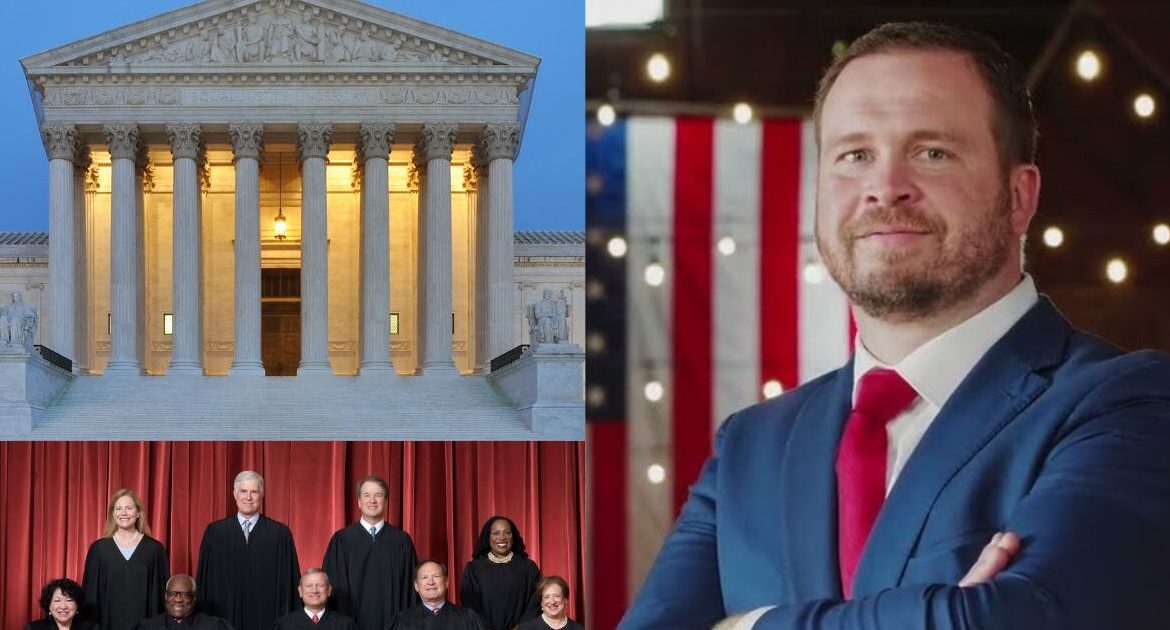
Supreme Court Refuses Case from Michigan Legislators Challenging Law Change Enabling Voter Fraud, Says Legislators ‘Lack Standing’ to Sue


The U.S. Supreme Court on Monday declined to hear an appeal brought by 11 Michigan lawmakers seeking to challenge controversial changes to state election law pushed through by progressive groups in 2018 and 2022.
Left-wing groups took millions in ‘dark money’ to run statewide referendums to eliminate all voter integrity laws and make challenging elections extremely difficult. The funds could have come from anywhere, and well-known loopholes in campaign finance law allow ‘layering’ so that foreign governments and left-wing billionaires can donate funds to non-profits and then have those funds eventually transferred to 501(c)4 entities that can engage in ballot initiatives.
Left-wing groups such as “Promote the Vote” raised $23 million in 2022 from dark money to repeal voter integrity laws, and the main group opposing their efforts only raised $4.1 million.
The lawmakers challenging these ballot initiatives, led by State Sen. Jonathan Lindsey (R-Coldwater), had argued that Promote the Vote’s ballot proposals, Proposal 3 of 2018 and Proposal 2 of 2022, unconstitutionally interfered with the state legislature’s authority to regulate federal elections.
“The court seems to feel we don’t have standing, but it’s our responsibility in a Constitutional Republic to set the time, place, and manner of elections, and when that is usurped like this, it clearly erodes the will of the people,” Rep. Steve Carra told the Gateway Pundit. Rep. Carra is one of the signatories to the suit. “I think prop 2 only made it a lot easier to commit systemic voter fraud in Michigan.”
Carra continued, “They used millions of dollars in George Soros and out-of-state money to deceive voters, and now that they enshrined this in the Constitutional, further solidifies their ability to engage in systemic voter fraud.”
The authority for state legislatures to regulate elections is primarily derived from the Elections Clause of the U.S. Constitution. This clause, found in Article I, Section 4, Clause 1, states:
“The Times, Places and Manner of holding Elections for Senators and Representatives, shall be prescribed in each State by the Legislature thereof…”
The district court tossed the Senator’s lawsuit in April, ruling the legislators lacked standing. The Sixth Circuit upheld that ruling in December. With the Supreme Court declining to take the case, the lower court decisions stand, effectively insulating the changes from further federal challenge.
Generally, the court had previously said that the legislators “did not suffer a concrete and particularized injury.”
More specifically, the Sixth Circuit had said last December that the lack of standing was from a combination of reasons, including:
- They did not represent the entire legislature or a controlling bloc within it.
- Legislators generally lack standing to assert institutional injuries of the legislature.
- Legislators had not shown that their votes were nullified by the amendments.
Essentially the court said that only entire legislatures can sue, and that only individual legislators can sue when they can show that they were individually and particularly harmed.
Critics point out that, practically speaking, this ensures that majorities can use as much voter fraud as they want as long as they use enough of it to maintain a majority, and also protect it in law.
The 11 Republican legislators who filed the suit were:
- Sen. Jonathan Lindsey,
- Sen. Jim Runestad,
- Rep. James DeSana,
- Rep. Rachelle Smit,
- Rep. Steve Carra,
- Rep Joseph Fox,
- Rep. Matt Maddock,
- Rep. Angela Rigas,
- Rep. Josh Schriver,
- Rep. Neil Friske,
- Rep. Brad Paquette
The statewide proposals were backed by a coalition of left-leaning groups including the ACLU, NAACP, and the Michigan League for Public Policy.
Proposal 3 of 2018 amended the Michigan Constitution to enshrine straight-ticket voting, same-day voter registration, and no-reason absentee ballots.
Proposal 2 of 2022 further expanded voting access with nine days of early in-person voting, more ballot drop boxes, and taxpayer-funded absentee ballot tracking and postage. Critics of Prop 2 note that drop boxes are unsecure, and that serial fraud has been observed in absentee ballots in Michigan, among other loopholes that the amendment codified into law.
Michigan Secretary of State Jocelyn Benson, a Democrat who has consistently defended the initiatives, celebrated the court’s refusal to intervene. “This is a victory for the people of Michigan,” Benson said. “I hope this marks the end of an era filled with frivolous lawsuits and attacks on our elections.”
Critics argue that the initiatives were sold to voters under the guise of “access” but effectively eroded election security and legislative control. “These ballot proposals didn’t just expand voting. They cemented partisan control over Michigan’s election system,” said one GOP staffer familiar with the case. “This was a legal power grab wrapped in the language of ‘voting rights.’”
Attorney Erick Kaardal represented the Republican legislators.
Despite winning at the ballot box, the progressive campaign received millions in out-of-state funding and significant legal support from national organizations. Critics say the campaign strategy was to bypass lawmakers altogether and embed their changes directly into the state constitution, making future legislative correction almost impossible.
The post Supreme Court Refuses Case from Michigan Legislators Challenging Law Change Enabling Voter Fraud, Says Legislators ‘Lack Standing’ to Sue appeared first on The Gateway Pundit.
